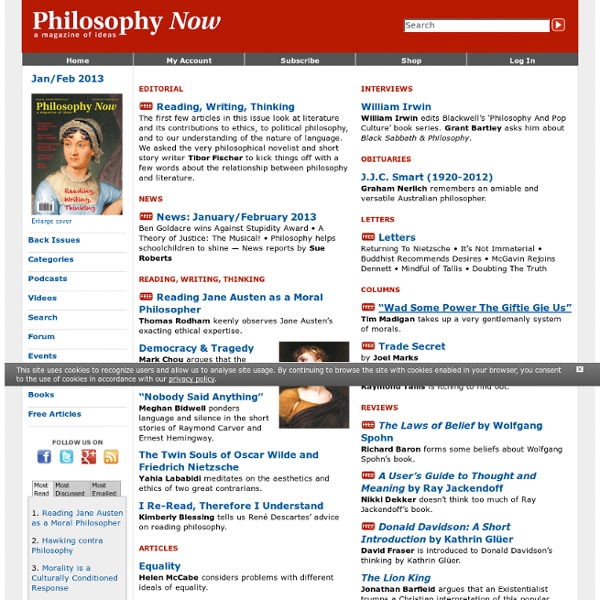



Notes From an Employed Philosopher - The Conversation In an interview with radio talk-show host Bill Bennett, Pat McCrory, North Carolina’s governor, criticized the “educated elite” for offering courses that supposedly don’t help graduates get jobs. He specifically attacked areas of study like philosophy and gender studies, both of which are strong programs at the University of North Carolina at Chapel Hill. As a matter of fact, the Chapel Hill doctoral program in philosophy is ranked ninth in the country according to the annual Leiter report on programs in the field, joining Harvard, Yale, New York, and Stanford Universities in the top 10. That particular piece of information didn’t come up in the interview, however. Speaking about these areas of study, McCrory stated, “If you want to take gender studies that’s fine, go to a private school and take it. Now, I am not going to argue that there isn’t such a thing as an “academic elite.” Is a liberal-arts education for everyone? McCrory himself studied political science and education.
Integration of Exponential Functions About this document ... The following problems involve the integration of exponential functions. We will assume knowledge of the following well-known differentiation formulas : where , and where is any positive constant not equal to 1 and is the natural (base ) logarithm of . As you do the following problems, remember these three general rules for integration : where is any constant not equal to -1, where is any constant, and Because the integral where is any nonzero constant, appears so often in the following set of problems, we will find a formula for it now using u-substitution so that we don't have to do this simple process each time. so that or Now substitute into the original problem, replacing all forms of , and getting We now have the following variation of formula 1 The following often-forgotten, misused, and unpopular rules for exponents will also be helpful : and Most of the following problems are average. Integrate . Click HERE to see a detailed solution to problem 1. Integrate .
Royal Institute Philosophy Stanford Encyclopedia of Philosophy Levinas Reading Group: Links/Resources PRIMARY SOURCES Collected Philosophical Papers | Trans. Alphonso Lingis Ethics and Infinity: Conversations With Philippe Nemo | Trans. Richard Cohen Existence and Existents | Trans. Alphonso Lingis New Talmudic Readings | Trans. SECONDARY SOURCES An-Archy and Justice: An Introduction to Emmanuel Levinas's Political Thought | William Paul Simmons Addressing Levinas | Eds. LINKS The Emmanuel Levinas Web Page | Peter Atterton The Levinas Center at UNCC | Richard Cohen Colloquium on Violence & Religion Corrected Index to Otherwise Than Being: keyword index | name and title index Center for Advanced Research in Phenomenology ESSAYS "The Jewish Understanding of Scripture" | Emmanuel Levinas "Ethics and Trauma: Levinas, Feminism, and Deep EcologyY" | Roger S.
e-International Relations — the world's leading website for students of international politics EpistemeLinks: Philosophy Resources on the Internet Aristotle's Revenge The Non-Philosopher's Guide to Can Bad Men Make Good Brains do Bad Things? (or Why does anyone think this is funny?) Consider the following case: On Twin Earth, a brain in a vat is at the wheel of a runaway trolley. There are only two options that the brain can take: the right side of the fork in the track or the left side of the fork. There is no way in sight of derailing or stopping the trolley and the brain is aware of this, for the brain knows trolleys. The brain is causally hooked up to the trolley such that the brain can determine the course which the trolley will take. On the right side of the track there is a single railroad worker, Jones,who will definitely be killed if the brain steers the trolley to the right. If the brain in the vat chooses the left side of the track, the trolley will definitely hit and kill a railman on the left side of the track, "Leftie" and will hit and destroy ten beating hearts on the track that could (and would) have been transplanted into ten patients in the local hospital that will die without donor hearts. G.E.M.
Studying Economics Philosophy Pages